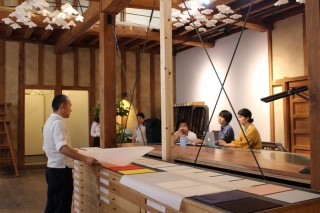Loading
Search
▼ ‘Scattered-Style’ Hotel Business Spreading
- Category:Other
TOKYO (Jiji Press) — A unique hotel business to offer services at accommodations and eateries scattered about within walking distance is spreading in Japan.
Often reutilizing traditional Japanese houses as hotel facilities, the business aims to allow guests to walk around a city as if in a hotel and experience local culture and cuisine.
The business of operating such scattered-type hotels is believed to have originated in Europe.
In Japan, Maruyama Village, a facility that opened in 2009 in the city of Sasayama, Hyogo Prefecture, is said to be the pioneer. Users of the facility can enjoy activities such as agriculture experiences, pottery making and tea ceremony while staying at renovated traditional Japanese houses.
In Mino, Gifu Prefecture, which flourished with the production and trading of high-quality Japanese washi papers during the Edo period (1603-1868), a traditional Japanese house more than 100 years olf of a washi merchant was renovated into a hotel.
An association of local paper manufacturing companies is involved in the management of the hotel, which opened in July, to promote the charms of Mino washi.
Many old merchant houses still stand in Mino. The front desk of the hotel is located in another renovated traditional house, while a vacant traditional house nearby is currently being renovated to become the second accommodation facility of the hotel.
Six hotel rooms can be used, each by up to seven people. The room charge starts at ¥20,000 per head.
Jun Mizuishi, a 36-year-old resident in Saitama Prefecture used the hotel for group training. “We could fully enjoy Mino by experiencing local cuisine cooking and Mino washi making as well as by looking at landscapes,” Mizuishi said.
Scattered-style hotels are operated also in Otsu; Kyoto; Obama, Fukui Prefecture; and other areas.
Preparations to open such a facility are currently underway in Hokkaido and Kumamoto Prefecture.
Airi Ishikawa, an official at travel website Ikyu Corp., said scattered-type hotels are spreading because business collaboration with local entities tends to work smoothly thanks to expectations that such projects will help resolve the issue of abandoned houses and vitalize local communities.
Those involved in the businesses are also hoping that such business may encourage foreign tourists to visit their communities.
Often reutilizing traditional Japanese houses as hotel facilities, the business aims to allow guests to walk around a city as if in a hotel and experience local culture and cuisine.
The business of operating such scattered-type hotels is believed to have originated in Europe.
In Japan, Maruyama Village, a facility that opened in 2009 in the city of Sasayama, Hyogo Prefecture, is said to be the pioneer. Users of the facility can enjoy activities such as agriculture experiences, pottery making and tea ceremony while staying at renovated traditional Japanese houses.
In Mino, Gifu Prefecture, which flourished with the production and trading of high-quality Japanese washi papers during the Edo period (1603-1868), a traditional Japanese house more than 100 years olf of a washi merchant was renovated into a hotel.
An association of local paper manufacturing companies is involved in the management of the hotel, which opened in July, to promote the charms of Mino washi.
Many old merchant houses still stand in Mino. The front desk of the hotel is located in another renovated traditional house, while a vacant traditional house nearby is currently being renovated to become the second accommodation facility of the hotel.
Six hotel rooms can be used, each by up to seven people. The room charge starts at ¥20,000 per head.
Jun Mizuishi, a 36-year-old resident in Saitama Prefecture used the hotel for group training. “We could fully enjoy Mino by experiencing local cuisine cooking and Mino washi making as well as by looking at landscapes,” Mizuishi said.
Scattered-style hotels are operated also in Otsu; Kyoto; Obama, Fukui Prefecture; and other areas.
Preparations to open such a facility are currently underway in Hokkaido and Kumamoto Prefecture.
Airi Ishikawa, an official at travel website Ikyu Corp., said scattered-type hotels are spreading because business collaboration with local entities tends to work smoothly thanks to expectations that such projects will help resolve the issue of abandoned houses and vitalize local communities.
Those involved in the businesses are also hoping that such business may encourage foreign tourists to visit their communities.
- September 29, 2019
- Comment (0)
- Trackback(0)


